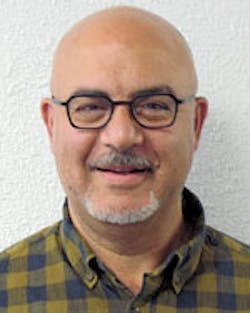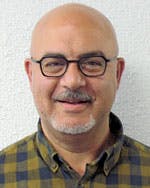LGP’s Reda Iskarous discusses eliminating repetitive stress motion injuries with lab automation
Professional:
Mr. Iskarous founded Laboratory Growth & Productivity in 2000 to research,
develop, and design automation systems used in pre- and post-analytical diagnostic laboratories. He began his career as a medical technologist, and served as an engineer for Beckman Coulter Diagnostics from 1988 through 1997.
Education:
Bachelor of Science in biology, SUNY Stony Brook, NY; in electronics and computer programming, Grumman Institute, Long Island, NY; graduate studies in biomedical engineering, Polytechnic University, Brooklyn, NY
Personal:
“I am grandfather to three beautiful girls, 11, 9, and 8 years old. I am thankful for my wife and for the life I have been given. I love grilling/smoking food and outdoorsy activities from gardening to skiing.”
What originally motivated you to solve the problem of repetitive stress injuries? I worked as a clinical laboratory scientist for five years while I was pursuing graduate studies in biomedical engineering. My tenure as an MT helped me recognize the burden of the repetitive stress tasks that technicians and technologists face daily in the laboratory. It also helped me realize that there is a huge need for benchtop pre- and post-analytical automated equipment that is efficient, simple, and smart. Meeting those criteria is always Laboratory Growth & Productivity Consulting’s aim when we design products.
If you were explaining Laboratory Growth & Productivity (LGP) to someone who is not familiar with the organization, how would you characterize its primary areas of expertise? LGP is an innovative company that excels in providing automation solutions that are simple, savvy, and affordable, driven to eliminate exposure to repetitive stress motion in order to avoid potential injury. Our efforts in this direction are realized in our Pluggo Decappers, KapSafe Recappers, and soon-to-be-released benchtop Archiver. LGP also provides consulting services to assess laboratory workflow and assist labs in doing more work at higher quality and with greater efficiency.
What major categories of solutions does the company provides for the clinical lab? LGP has brought to the market our Pluggo Decappers in four models, from decapping a single tube on the Pluggo Solo, to decapping up to 2,400 tubes per hour on our Pluggo RH (rack handler) model. In 2012, LGP was listed by the CDC in one of its Morbidity and Mortality Weekly Reports as one of several manufacturers that market safety devices to help remove caps from tubes. Since recapping is as much a cause of repetitive stress motion as decapping, we also provide our KapSafe Recapper systems, which we also offer in four models. Our latest innovation will be the benchtop Archiver. It will accept analyzer (personality) racks and archive the tubes into 5 x10 trays for storage.
Tell us about how LGP started. Did it begin with the consulting side or the manufacturing/distribution side? In 2000, LGP started solely as a consulting firm. Back in 1993, when Beckman Coulter was the first company outside of Japan to distribute and support Total Lab Automation, I was fortunate to be the Coulter engineer selected to live and learn in Japan in order to transfer lab automation knowledge and know-how to all countries in which Coulter sold lab automation. Fast forward to the year 2000, when a good friend in the industry suggested that I start a consulting firm to assist labs in understanding and selecting the appropriate lab automation systems. Laboratory Growth & Productivity was created in January 2000.
What has been the most rewarding aspect of your LGP endeavor? What is your greatest challenge? As hard as the road is from idea to a working product, it is still most rewarding to see our products succeed in the real world of the laboratory. Also, it’s great to hear how our customers simply “fall in love” with our products. As for challenges, we are constantly challenged to come up with innovative ideas to keep the systems benchtop and pneumatics-free, yet as fast, if not faster, than large automation systems in pre- and post-analytical processing.
What is some of the most useful feedback that you’ve received from customers? Here is some feedback we received from a customer in December: “We received the decapper at the beginning of the week and we are very happy with the results. The decapper was quick and easy to set up, decaps just as described, and is very clean when removing the caps. And most important, the fatigue we feel on our hands every day has been completely eliminated for this task.” That kind of positive feedback is useful because it reminds us here at LGP of why we do what we do. It also helps keep our eye on our goal of continuing to design products that are effective as well as easy to use.
How have the company’s solutions evolved throughout the years? We have the engineering itch, and this naturally leads to advancements in technology. In 2003, LGP started its own distribution/manufacturing endeavor. We began to distribute the Pluggo Standard Decapper, decapping from a 24-position Pluggo carousel, a Swedish product. Very quickly we realized that some modifications were needed. CLINICON AB, the Swedish manufacturer, awarded LGP the right to develop and implement the necessary changes to handle the higher volumes in the U.S. market.
In 2006, LGP started development on the Pluggo RH Decapper, which decaps multiple analyzer (personality) racks. The Pluggo RH Decapper was launched in mid-2007. In 2009, we realized the need for the Pluggo RHs (rack handler single) Decapper to handle a single analyzer (personality) rack at a time, for some hospital markets that desire the convenience of decapping straight from an analyzer rack without the need for a multi-rack handler. The Pluggo RH is now pretty flexible, and we effectively use it to decap “long” racks like those manufactured by Hamilton, ImmucorNEO, Tecan, and others.
In 2013, LGP released our KapSafe Recapper instruments, for the automated bench-top recapping of sample tubes. KapSafe is a 2 foot x 2 foot benchtop instrument that does not utilize pneumatics, is very quiet, and is a workhorse, recapping for up to 1,200 tubes per hour.


